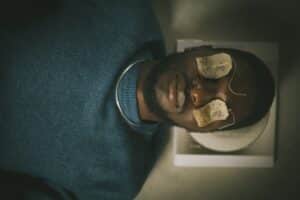When people think about trauma, they often think about soldiers going to war and returning home with a severe case of Post-Traumatic Stress Disorder (PTSD). While this is a possible scenario, trauma can also be less extreme. Trauma is our emotional reaction to a damaging experience. The psychological equivalent of the body’s reaction to a severe injury.
However, the tricky thing with psychological trauma is that unlike a bruise on your skin, it often does not magically heal by itself. This is because trauma can change our brain structure. When we do not feel supported by others in a threatening situation, or when the threat is persistent, stress hormones alter the functioning of certain brain areas. Therefore, trauma often affects our physical body as well. Trauma might just explain your ‘inexplicable’ stomachache, and why you felt nauseated.
Unhealed trauma
Sometimes our coping mechanisms and support system are strong enough to naturally help us heal from trauma. Other times, unhealed trauma changes the way we experience the world. Unhealed trauma can manifest itself in various ways:
- flashbacks
- nightmares
- concentration difficulties
- preoccupation about an experience
Some people who have unresolved traumas are fixated on their trauma, and feel it intensely. Their trauma keeps them stuck in their body’s ultimate survival mode reactions: flight, fight or freeze. This might manifest itself as an anxiety attack or having trouble sleeping at night. Others mentally distance themselves from their trauma and feel nothing at all or it affects their behaviour more subtly. For example by ‘blanking out’ or having trouble remembering a specific period of time.
In any case, unresolved trauma affects how we respond to the world, and inevitably, will also impact our relationships.
Unhealed trauma’s impact on relationships
When we have unhealed trauma, it becomes the lens through which we view the world, and subsequently our relationships. This makes us more susceptible to misinterpret benign behaviours as threatening, because our trauma chronically puts us at high alert. This can trigger us into the primitive flight, freeze or fight emotional states, and lead us to act in paranoid or aggressive ways. In turn this may trigger negative reactions from others and create a self-fulfilling prophecy.
Yet others become overly dependent on their relationships. Either way what ultimately ends up happening is that, as the popular phrase goes, “hurt people hurt people”, and most often the person we hurt the most is ourselves. The walls we build around our inner worlds for fear of getting hurt deprive us of a valuable experience: intimacy. We often feel ashamed of what happened to us and dare not confide to others. In survival mode there is no room for blind faith, while it is this faith that fosters healthy relationships. Studies have also shown that mothers who had a traumatic youth, had a lower ability to detect distress in their infants. Again preventing an intimate bond from actualizing.
How do we move forward?
Fortunately, there is a sunny ending to this gloomy story; even if it’s been many years since your traumatic experience has occurred, studies show that it’s never too late to heal.There are many things we can do to heal our trauma, and through neuroplasticity even our brain can heal itself.
A first step can be to explore the different types of therapy that are out there. Some of the most effective methods of healing trauma are psychotherapy and trauma-processing methods such as Eye Movement Desensitization and Reprocessing (EMDR). However, since trauma also affects the body, it is important to engage the body in the healing process. Yoga is an accessible first method to do so. Journaling can also relieve symptoms.
Creating awareness is the first step. Be proud that your healing journey has begun, and take it step by step.










